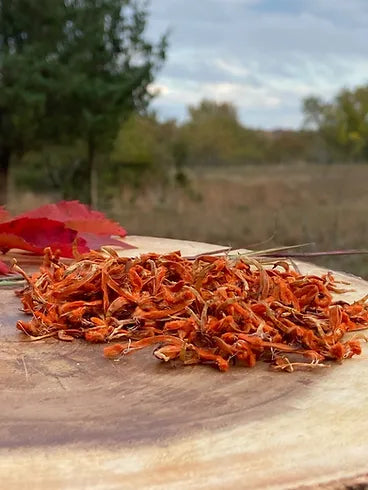
Healing Herbals
Wild Dagga
Wild Dagga
Couldn't load pickup availability
What is Wild Dagga?
What is Wild Dagga?
Wild Dagga is a tall, bright-orange flowering plant from South Africa known for its soft, minty scent and long history of being enjoyed for its potential calming, mellowing effects.
How to enjoy
How to enjoy
Healing Herbals Wild Dagga can be enjoyed as an herbal dietary supplement tea, as an extract or in capsule form.
Safety & Testing
Safety & Testing
Healing Herbals Store is commited to quality kanna, extracted and perfected to ensure premium plant based alkaloids suspended on a mannitol substrate to ensure a consistent, high-quality & compliant product.
Wild Dagga (Leonotis leonurus) Dried Flowers
Wild Dagga, or Lion's Tail, is an indigenous South African wildflower. Dried flowers have been greatly valued in traditional use and are still used today due to their adaptability.
How to use
- Steep in hot herbal tea.
- Use as a part of a smoking or vaporizing blend.
- Mix into your own individual blended herbal recipes.
What's Inside
100% dried Wild Dagga (Leonotis leonurus) flowers. Nothing added.
FDA Disclaimer
This item is not approved by the Food and Drug Administration. It is not intended to diagnose, treat, cure, or prevent any disease.
Share


Wild Dagga Farm Direct
Grown At Small Family Farm
We grow our own small family owned farm in South Africa. We have taken over
Organic Growing Practices
We practice natural growing processes including no harsh chemicals, synthetic fertilizers etc. Our plants have been here for years, and we now steward with love and a tight oversight to ensure the dagga plants produce flowers we would enjoy ourselves.
Fresh Flowers
Our Wild Dagga is harvested just for our store here in New York. When you buy Wild Dagga, often it is freshly dried ensuring quality flavonoids, terpenes, and a quality undegraded product.
I personally love the effects of this product, it's very relaxing and helps wind down after long days of work, I would recommend this for anyone with stress or a work life

Quality of Healing Herbals Dagga
Healing Herbals commitment extends through sustainable and ethical sourcing of Wild Dagga (Wild Dogga). We ensure that our plant material is organically grown, without the use of synthetic chemicals, and sourced either from well-managed farms or sustainably maintained wild ecosystems on private lands including sourcing from our own farm in south africa under the guidance of traditional stewards of the land.

History of Wild Dagga
Wild Dagga’s been used for centuries in southern Africa for its bright orange “lion’s tail” flowers, with people smoking or brewing the leaves and blooms for relaxation, medicine, and rituals, and it’s also been used to treat fevers and coughs, as a natural dye, and even believed to boost courage and ward off bad spirits.


